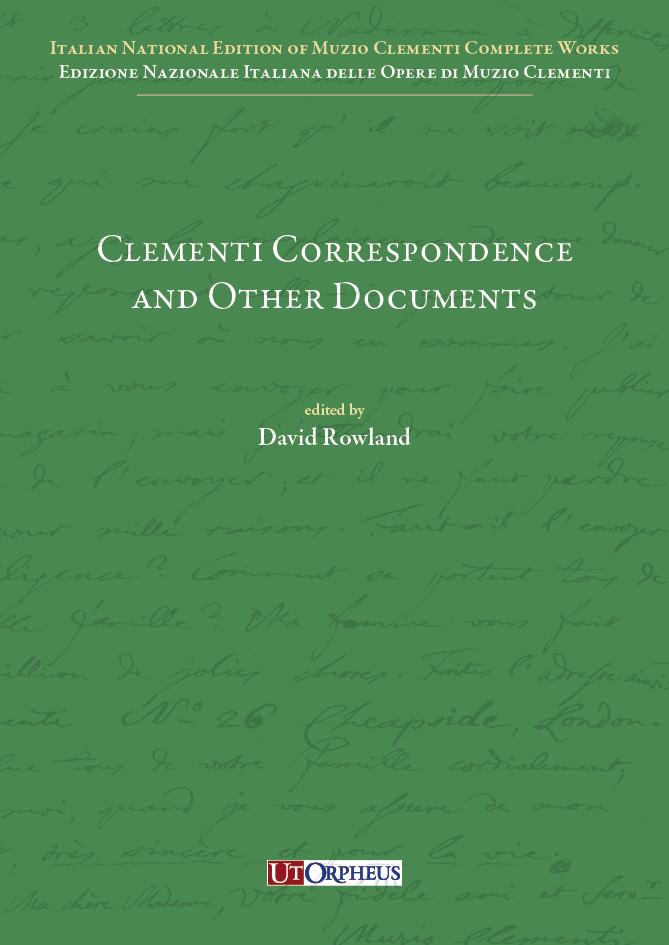edited by David Rowland, Bologna, Ut Orpheus Edizioni, 2024 (CCE 5), pp. lxxxvi+134, ISBN: 978-88-8109-542-1.
The Introduction to the first scholarly edition of Clementi’s letters (The Correspondence of Muzio Clementi, Ut Orpheus Edizioni, 2010) contained the comment ‘it is more than likely that one of the results of the enterprise will be the discovery of yet more correspondence’. Sure enough, a further 26 letters to and from Clementi and his business partners subsequently came to light and are edited in this new collection.
They are placed alongside other documents relating to Clementi which provide further information on his biography and business activities. The letters of Maria Gisborne (Emma Clementi’s sister-in-law) to Mary Shelley provide a number of insights into Clementi’s family life. Clementi’s ‘adoption’ papers contain details of the contract between Muzio, his father and the English gentleman Peter Beckford which paved the way for Muzio’s removal to England at an early age.
Clementi’s own notebook, probably dating from the 1790s, reveals that Clementi was widely-read in subjects such as history, classics, literature and art. No doubt this education stood him in good stead as he entered London’s society, as related in the diary of William Godwin, Mary Wollstonecraft’s partner and later husband.
A part of Clementi’s life that has perplexed previous biographers has been his little-documented travels on the continent, especially in Italy, during 1826 and 1827. Extracts from the Journals of Clementi’s second wife, Emma, and his brother-in-law John Gisborne trace Muzio’s movements at this time, as well as providing many details of his family, friends and business associates. Information from all these sources provides significant, previously-unknown detail which is incorporated into a new account of Clementi’s life supplemented with biographical details of the major characters mentioned in the volume.
David Rowland is Professor of Music and former Dean of Arts at The Open University, where he has worked since 1989. Following his first book, A History of Pianoforte Pedalling (1993) he has published extensively on the performance history of the piano and early keyboard instruments, a topic on which he continues to research. His interest in piano history also led to an investigation of Muzio Clementi and in 2010 he published the first scholarly edition of Clementi’s correspondence. This provided the impetus for a much broader investigation of the London music trade during the French Revolution and Napoleonic wars, and to several chapters and articles on music publishing during the period. A further research interest has been listening history and as Principal Investigator he led a team of scholars funded by the Arts and Humanities Research Council studying a number of aspects of historical listening. In addition to his scholarly activities David also performs on a variety of early and modern keyboard instruments. In 1981 he won the prestigious St Albans International Organ Competition and in the following year he was a major prize-winner at the Dublin International Organ festival. He has been Director of Music at Christ’s College, Cambridge since 1984.











![Boccherini, Luigi. 6 Sextets for Strings Op. 23 (G 454-459) [Opera Omnia – Vol. XIX]](https://www.luigiboccherini.org/wp-content/uploads/2022/09/bce009-324x235.jpg)